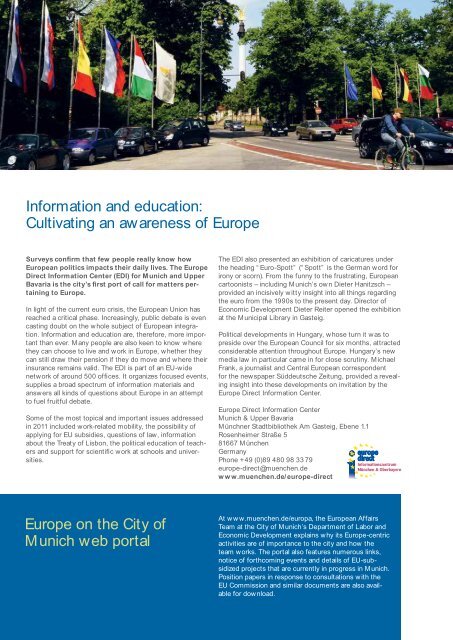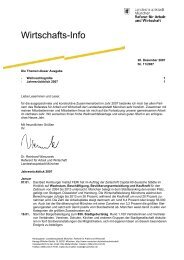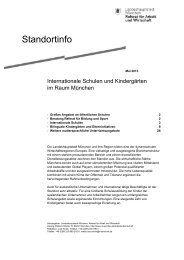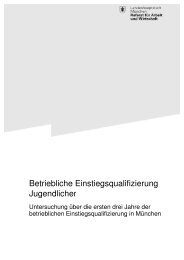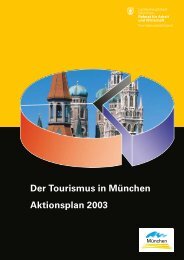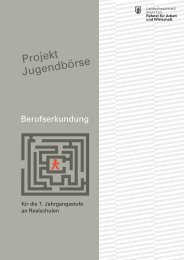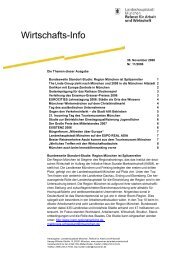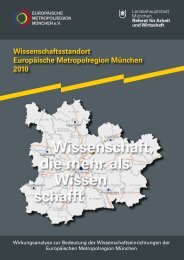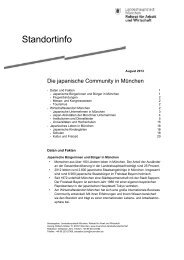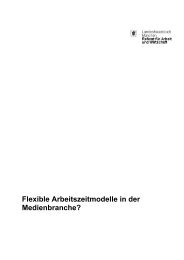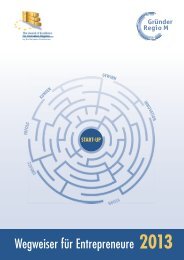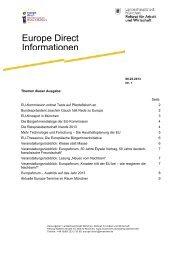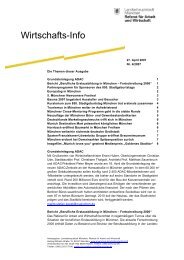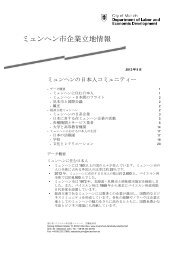Europa-Tag - Referat für Arbeit und Wirtschaft
Europa-Tag - Referat für Arbeit und Wirtschaft
Europa-Tag - Referat für Arbeit und Wirtschaft
You also want an ePaper? Increase the reach of your titles
YUMPU automatically turns print PDFs into web optimized ePapers that Google loves.
Information and education:<br />
Cultivating an awareness of Europe<br />
Surveys confi rm that few people really know how<br />
European politics impacts their daily lives. The Europe<br />
Direct Information Center (EDI) for Munich and Upper<br />
Bavaria is the city’s fi rst port of call for matters pertaining<br />
to Europe.<br />
In light of the current euro crisis, the European Union has<br />
reached a critical phase. Increasingly, public debate is even<br />
casting doubt on the whole subject of European integration.<br />
Information and education are, therefore, more important<br />
than ever. Many people are also keen to know where<br />
they can choose to live and work in Europe, whether they<br />
can still draw their pension if they do move and where their<br />
insurance remains valid. The EDI is part of an EU-wide<br />
network of aro<strong>und</strong> 500 offi ces. It organizes focused events,<br />
supplies a broad spectrum of information materials and<br />
answers all kinds of questions about Europe in an attempt<br />
to fuel fruitful debate.<br />
Some of the most topical and important issues addressed<br />
in 2011 included work-related mobility, the possibility of<br />
applying for EU subsidies, questions of law, information<br />
about the Treaty of Lisbon, the political education of teachers<br />
and support for scientifi c work at schools and universities.<br />
Europe on the City of<br />
Munich web portal<br />
The EDI also presented an exhibition of caricatures <strong>und</strong>er<br />
the heading “Euro-Spott” (“Spott” is the German word for<br />
irony or scorn). From the funny to the frustrating, European<br />
cartoonists – including Munich’s own Dieter Hanitzsch –<br />
provided an incisively witty insight into all things regarding<br />
the euro from the 1990s to the present day. Director of<br />
Economic Development Dieter Reiter opened the exhibition<br />
at the Municipal Library in Gasteig.<br />
Political developments in Hungary, whose turn it was to<br />
preside over the European Council for six months, attracted<br />
considerable attention throughout Europe. Hungary’s new<br />
media law in particular came in for close scrutiny. Michael<br />
Frank, a journalist and Central European correspondent<br />
for the newspaper Süddeutsche Zeitung, provided a revealing<br />
insight into these developments on invitation by the<br />
Europe Direct Information Center.<br />
Europe Direct Information Center<br />
Munich & Upper Bavaria<br />
Münchner Stadtbibliothek Am Gasteig, Ebene 1.1<br />
Rosenheimer Straße 5<br />
81667 München<br />
Germany<br />
Phone +49 (0)89 480 98 33 79<br />
europe-direct@muenchen.de<br />
www.muenchen.de/europe-direct<br />
At www.muenchen.de/europa, the European Affairs<br />
Team at the City of Munich’s Department of Labor and<br />
Economic Development explains why its Europe-centric<br />
activities are of importance to the city and how the<br />
team works. The portal also features numerous links,<br />
notice of forthcoming events and details of EU-subsidized<br />
projects that are currently in progress in Munich.<br />
Position papers in response to consultations with the<br />
EU Commission and similar documents are also available<br />
for download.<br />
Professional communication:<br />
The result of professional work<br />
As a clear visual expression of the city’s intensive<br />
commitment to European affairs, a uniform graphical<br />
logo has been developed on the basis of the existing<br />
Munich layout.<br />
Its core component is the “Munich Loves You” heart fi lled<br />
with a stylized map of Europe that is absorbing points of<br />
light as seen from space.<br />
Europe Day:<br />
New concept well received<br />
On May 6, 2011, the City of Munich unveiled a new<br />
concept to celebrate Europe Day on the Marienplatz, in the<br />
Prunkhof courtyard, in the Kassenhalle and in the Large<br />
Meeting Room at City Hall. Representatives of the<br />
EU Commission and the EU Parliament in Munich and of<br />
<strong>Europa</strong>-Union-München e.V. acted as cooperation partners<br />
for the event. A large number of visitors stopped by at<br />
the information booths; and lots of children learned something<br />
about the 27 member states of the European Union<br />
in aplayful way. Schoolchildren worked and debated in a<br />
“pupils’ parliament”; and a young, laid-back audience spent<br />
the afternoon listening to music from three popular local<br />
bands on a stage in front of City Hall. The day’s events<br />
were ro<strong>und</strong>ed off with a panel discussion whose title question<br />
– “Does our future lie with the euro?” – was answered<br />
by experts and politicians alike with a reso<strong>und</strong>ing yes!<br />
Lots of visitors eagerly took advantage of the opportunity<br />
to gather information and talk to representatives of the<br />
European Union. Topics such as the fi nancial crisis in<br />
Greece, Ireland and Portugal, the stream of refugees fl owing<br />
in from North Africa and the freedom of movement<br />
for workers, which came into force on May 1, 2011, were<br />
raised again and again in the course of Europe Day.<br />
Save the date: In 2012, Europe Day will be celebrated on<br />
May 11 at City Hall, in the Prunkhof and on the Marienplatz.<br />
Updates will be published at www.muenchen.de/europa.<br />
<strong>Europa</strong>-<strong>Tag</strong><br />
In Kooperation mit:<br />
EUROPÄISCHE KOMMISSION<br />
Regionalvertretung in München<br />
Strategy Annual Report on European Activities 2011 19<br />
The wording “Europe connects” is mirrored visually on<br />
the cover picture of this year’s Annual Report on European<br />
Activities, for example, which shows Munich refl ected in<br />
the Atomium in Brussels. German and English versions of<br />
the logo are available, as is the case for most publications<br />
and a wealth of relevant information.<br />
Internally, European matters are communicated fi rst and<br />
foremost via a dedicated newsletter and a separate intranet<br />
site. Externally, the website (see box) is complemented by<br />
a variety of events and publications for residents of Munich.<br />
Press relations is the more diffi cult aspect of the work, as<br />
local media still tend to see Europe as a topic that is hard to<br />
communicate and has few regional touchpoints. One challenge<br />
is therefore to use practical examples to more clearly<br />
illustrate the infl uence that Europe has on Munich. After<br />
all, the EU ultimately has a direct impact on many aspects<br />
of life in Munich, as this Annual Report demonstrates in no<br />
uncertain terms.<br />
6. Mai 2011<br />
Marienplatz<br />
<strong>und</strong> Rathaus<br />
14 Uhr Tänze<br />
15.30 – 19.30 Uhr live: JB‘s FIRST,<br />
Nina Alverdes<br />
G.Rag y los Hermanos Patchekos<br />
14 – 19 Uhr <strong>Europa</strong> entdecken<br />
14 – 19 Uhr Markt der Möglichkeiten<br />
19 Uhr Der Euro – unsere Zukunft?<br />
Podiumsdiskussion<br />
www .muenchen .de / europa


